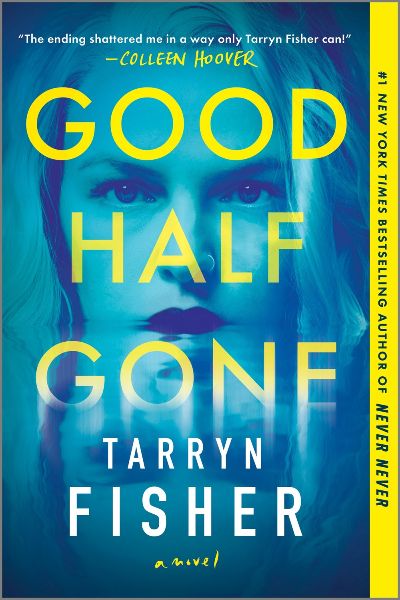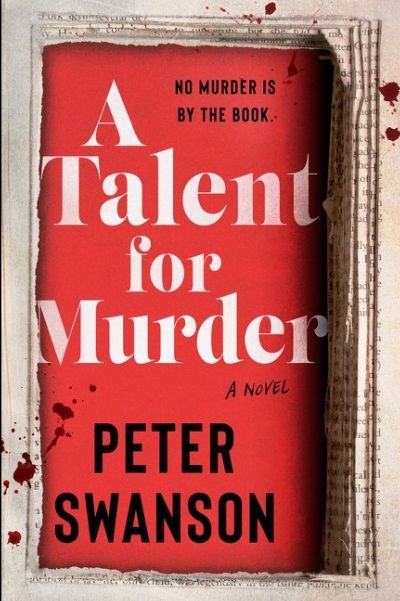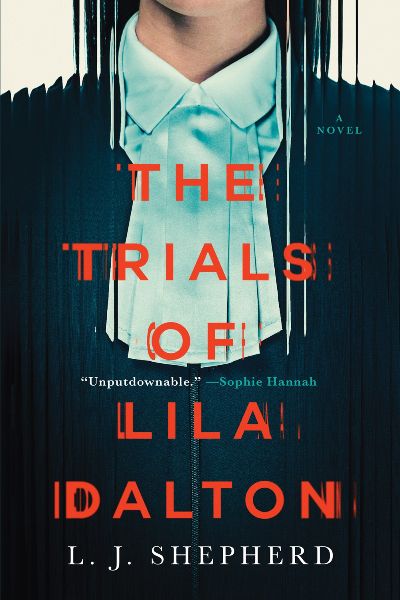In many ways, Kingston and Jasmyne Williams are living their dream life. Their little boy, Kamau, is thriving. They have another baby on the way. And Kingston, or King, is making oodles of money in finance. But King is eager for a next step: moving them to Liberty, a controversial suburban Los Angeles community of very, very rich Black people that comes with all the trappings. A sumptuous spa—sorry, wellness center. Lavish homes with three living rooms each (one for everyday, one for company, and a den, of course). And an excellent school for Kamau where every teacher is Black and they won’t have to worry about him fitting in. From the moment she reluctantly agrees to this transformation of their lives, Jasmyn is nervous about abandoning her community and her belief in giving other Black people a hand up. And she’s right: Liberty turns out to be one sinister place, in ways readers will never guess and that will keep them on edge right up to the last gasp of surprise. Yoon’s first adult novel has some of the hallmarks of her YA background: a character who feels like it’s her against the world, a shifting sense of who can be trusted, and a feeling of not fitting in. This will be a great crossunder read for young adults as well as a hit with fans of Zakiya Dalila Harris’s The Other Black Girl.
Thrillers
Alering’s striking, dark debut novel mixes magical realism with crime and dire poverty. Sheila, 17, and Angie, 12, are sisters living on the absolute edge in 1980s Appalachia. Their father is dead, their brother in prison, and they and their mother live with an elderly relative, growing vegetables and keeping rabbits for food. Sheila keeps her side of the room neat, Angie very much doesn’t, and the differences only begin there, with the most significant being in their dubious magical gifts: Sheila is burdened and chafed by a rope around her neck, visible only to her, that grows thicker and longer over time. Angie draws sinister tarot-type cards that she carries everywhere, with figures like “A creature made of root and sinew [with] a crooked crown of worms” that give her frighteningly accurate messages. Outside the squalor the girls live in are the hikers, whom they think of as impossibly rich, trekking the nearby Appalachian trail with their fancy equipment and cluelessness. When two of them are killed, Angie takes on the investigation, much to her sister’s exasperation. This is one of those novels whose setting and characters take the front seat—readers won’t soon forget Sheila and Angie and the lengths they go to to survive and find peace.
For me, the best kind of thriller is one with high emotional stakes, and this fits the bill, featuring a family that’s been torn apart by addiction and an unsolved crime. When they were 15, Iris and her twin sister, Piper, were tricked into meeting older boys, a tryst at which Piper was abducted. The police believed that Piper ran away, the trail went cold, and today lris is a bereft adult, living with her son and grandmother and still wondering what happened to her sister. The twins’ mother, an addict, gave up on finding Piper long ago. But, clinging to hope, Iris has landed an internship at Shoal Island Hospital, a facility in Seattle’s San Juan Islands whose sign has a space where the words “…for the Criminally Insane” used to be. Readers are gradually let in on who she’s there to meet, and along the way, flashbacks return to the time of the abduction as Iris sleuths and grieves in the present day. A closing twist adds fear and drama, but those are present in spades along the way too. This fast read will be a hit with those who enjoy a female-led thriller that features an at-first-powerless protagonist who must seize the reins.
Sexy and perverse, deceitful and disturbing, this is one domestic thriller that doesn’t hold back. Elena and Adam are house sitting in South London when they come across the beautiful painter Sophia and her equally handsome husband, Finn. Sophia and Finn are suave and sophisticated, and dinner with the four soon evolves into casual meetings between the two women, and eventually friendship. Despite this, Elena can’t stop herself from becoming obsessed with Finn—sex with Adam leaves a lot to be desired—and Sophia recognizes Elena’s infatuation. But instead of being threatened, Sophia has a plan. Why don’t they exchange partners, with the men never the wiser? The women, physically very similar, will switch places during the night, when the men are asleep, making every possible effort—from hair to perfume—to trick their partners. Plausible? Barely. (Pro-tip: use blackout curtains). But while “switching” increases Elena’s fervor for Finn, for Sophia it opens up a whole world, one that she has been planning for ages. A fast and effortless read that never stops surprising.
An attack at an airport near Oklahoma City of a federal government prisoner transfer turns into the most deadly game for Matthew Redd and his family. The team responsible for the massacre has another name on its hit list, and already has their target on surveillance: Redd. As the team heads to Montana to take him out, a massive winter storm has settled over the region. Receiving a warning with minutes to spare, Redd has his family leave while he heads to high ground to make a last stand against an unstoppable army. But the snow is relentless, just like his enemies, and his initial confrontation invites more dangerous elements into his life. Steck brings the Western genre to the modern age with this nonstop action thriller. The writing delivers a cinematic experience as the forces have a last stand, and the small town and its citizens will be lucky to come out unscathed. This series is terrific, and Steck does a great job getting newcomers up to speed while delivering results fans have been waiting to see.
There were so many times when I wanted to yell DON’T DO THAT! at the characters in this dark tale of trying to do right by the ones you love but being tripped up by hapless choices at every turn. The cast is stuck, in various ways, in the orbit of the ruthless Winters crime family. Melissa Cruz, who’s “[smothering] her guilt in justification and Xanax,” is running from an abusive relationship with a member of the family, accompanied by her real love. The Winterses are not taking this betrayal lightly, and they’ve sent Lucky Wilson to find the couple and…well, Lucky is a professional assassin, even if his day job is real estate, so things don’t look good. Then there’s Lucky’s family: his wife, who he believes is having an affair, and his teenage daughter, who’s very much not into boys her own age. The fast-moving and sometimes-comic tale unfolds the back stories of the various characters, beautifully illustrating how bad decisions can be the product of fierce love and how what seems like the worst path might be a redemption. While waiting for this book, you’ll want to go back and try Aymar’s No Home for Killers and They’re Gone, as his writing is just great.
Dugoni (One Last Kill, Her Deadly Game) takes a detour into Seattle’s past in his latest legal thriller. In 1933, in a world worried about the rise of a German Chancellor named Adolf Hitler and the United States feeling the crunch of the Great Depression, a young man named William “Shoe” Shumacher leaves home to take a position at one of Seattle’s newspapers. Shoe receives assistance from a homicide detective and is given special access to a murder at a social club. A former boxer named Frankie Ray is killed by the club owner, George Miller, who claims self-defense. Shoe begins to suspect there is more to the story as he writes his daily updates for the Seattle Daily Star. Dugoni juggles a compelling crime story with a sweet romantic tale as Shoe falls for a young woman who works at a bakery, and they begin to fall in love, even as he spends every day in the courtroom watching the case unfold. The case is compelling, the characters are stellar, and the prose takes the reader back to a time when DNA and technology were not available to make a slam-dunk prosecution. Is it too early to say that this will be remembered as the best legal thriller of the year?
Librarian Martha Ratliff doesn’t expect to marry—isn’t running a public library in Maine satisfying enough?—until she meets Alan. A traveling salesman, Alan sells novelty items like t-shirts (“Math teachers aren’t mean. They’re above average”) at academic conferences. But as sweet as Alan might be, there’s something a bit off. Martha can’t help but do a little research, only to discover that five of the cities Alan visited have unsolved cases of murdered women, with all killed during Alan’s stay. Coincidence? Add to this the blood she finds on one of his dress shirts and Martha’s on the phone to Lily Kinter, a buddy from library school who helped Martha escape from an abusive boyfriend years ago. Could Martha be married to a serial killer? But Lily has her own baggage, and what started as a simple mystery explodes into a fascinating, dark, and complex novel of suspense. Every true-crime reader will find something to appreciate in this hugely inventive novel.
This brilliantly disorienting debut takes place on Assumption Island, a cold, rocky British outpost in the north Atlantic. Lila Dalton finds herself in an island courtroom being addressed by an impatient judge who clearly expects her to argue for her client. Lila has no idea how she got to this courtroom, how to be a barrister, what the case is…she doesn’t know anything, including who the stranger in the mirror is. Things take a turn for the (even) worse when she gets anonymous notes telling her that she’d better win acquittal for the murderer she’s representing if she ever wants to see her daughter again (that would be the daughter she didn’t know she had). The various characters working for and against Lila (we’re often unsure which direction a character is leaning, adding to the dark, compelling tale) are well drawn, with each adding complications and drama. Spare but gripping dialog propels the strange story to an appropriately dizzying conclusion. For fans of Hervé Le Tellier’s The Anomaly.
This sequel to the Northern Ireland-set Northern Spy (2021), in which Tessa Daly desperately searches for her sister, Marion, who has either been kidnapped by the IRA to work for them or is actually a terrorist, finds Tessa hiding in Dublin from the terrorists who want revenge. She’s enjoying a quiet, if lonely, life with her four-year-old son when she’s kidnapped by a gang that includes a childhood friend. He’s now in the IRA and wants Tessa’s help to turn an MI5 agent toward the Republican side. That starts a terrifying ordeal for Tessa, who walks a tightrope between British officialdom and homegrown extremists while keeping her son safe and pursuing a forbidden romance. As in the previous book, Berry portrays a modern Ireland that’s a maelstrom of contradictions, grief for the past and hope for the future, and fear that the country’s core can never really change. But there’s still hope for the Daly family, whose caring and exasperation toward one another makes this local drama into a universal fable of love overcoming all.










